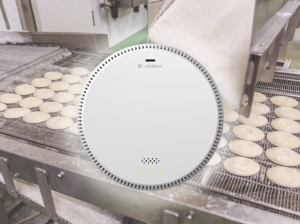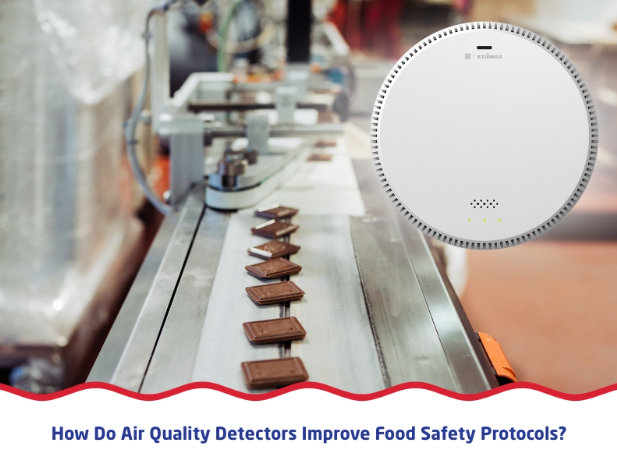Ensuring the safety and quality of food products is a priority for food manufacturers, restaurants, and other businesses in the food industry. Air quality plays a crucial role in maintaining a safe environment for food production, storage, and preparation. With technological advancements, air quality detectors like the Edimax AI-2005BE have become essential tools in food safety protocols. These devices help detect pollutants and contaminants that may compromise food safety, ensuring healthier and safer environments. This article explores how air quality detectors contribute to food safety and why they are indispensable in various food-related industries.
What role do air quality detectors play in food safety?
Air quality detectors serve as a proactive measure to maintain safe and hygienic conditions in food manufacturing environments. These devices monitor and detect various air pollutants that could potentially affect the quality of food. By identifying harmful particles such as PM2.5, CO2, volatile organic compounds (VOCs), and even vape and THC substances, air quality detectors help businesses:
- Prevent airborne contamination during food processing.
- Monitor conditions that could lead to the growth of harmful bacteria or mould.
- Ensure optimal ventilation in food preparation and storage areas.
Monitoring air quality in real-time allows businesses to take immediate action before contamination risks escalate, reducing the likelihood of foodborne illnesses or spoilage.
How do air quality detectors prevent contamination in food manufacturing?
In food manufacturing, contamination can occur from various sources, such as dust, allergens, chemicals, and even human activities. Airborne contaminants can easily find their way into food products, causing health risks and regulatory issues. Air quality detectors help prevent this by constantly monitoring air conditions and detecting contaminants early. Here’s how these devices can help reduce contamination:
- Continuous Monitoring: Real-time monitoring allows staff to respond quickly to any changes in air quality. Knowing the critical times to perform air monitoring during food processing can help ensure optimal conditions and prevent contamination.
- Preventing Chemical Exposure: Detects harmful chemicals, ensuring that volatile substances don’t reach food products.
- Improved Ventilation Control: By monitoring CO2 levels, air quality detectors help maintain proper airflow, preventing the build-up of stagnant air, which can lead to contamination.
- Early Detection of Mould or Bacteria Growth: Air quality detectors can alert businesses to take immediate preventive action by detecting environmental conditions conducive to bacteria or mould growth.
In food manufacturing, an ounce of prevention is worth a pound of cure, and air quality detectors provide that crucial preventive layer.
Can air quality detectors help with HACCP compliance?
The Hazard Analysis and Critical Control Points (HACCP) system is vital for ensuring food safety. It focuses on identifying and controlling potential hazards in the food production process. Understanding HACCP principles and guidelines is the first step in ensuring that food safety standards are met effectively. With air quality detectors integrated into the HACCP framework, businesses can better manage air quality-related risks, ensuring compliance with industry regulations.
- Monitoring Critical Control Points (CCPs): Air quality detectors monitor areas such as production lines, storage rooms, and food prep areas, which are key CCPs in food safety.
- Record Keeping for Audits: The Edimax AI-2005BE, for example, provides historical data, which is essential for documenting air quality trends and demonstrating compliance during audits.
- Real-time Alerts: Instant alerts when air quality parameters exceed acceptable limits ensure that corrective actions can be taken immediately.
Using air quality detectors for HACCP compliance ensures businesses meet required standards, reduce risk, and demonstrate due diligence during inspections. Identifying the best approaches for air quality assessment in food factories can further enhance this process, ensuring targeted monitoring of critical areas.
How accurate are air quality detectors in food safety?
The accuracy of air quality detectors is paramount, especially when it comes to food safety. The Edimax AI-2005BE boasts a high level of precision, providing accurate measurements of various air pollutants. These detectors measure key parameters that affect air quality, including:
| Pollutant | Measurement Range | Accuracy (%) |
| Particulate Matter (PM2.5) | 0-500 µg/m³ | ±10% |
| CO2 (Carbon Dioxide) | 0-5000 ppm | ±5% |
| VOCs (Volatile Organic Compounds) | 0-1000 ppb | ±5% |
| Temperature | -10°C to 50°C | ±1°C |
| Humidity | 0-100% | ±3% |
Are air quality detectors cost-effective for food manufacturers?
While air quality detectors might seem like an added expense, they can be a cost-effective solution in the long run. Investing in air quality detectors for safer food production can save businesses significantly by preventing contamination, ensuring HACCP compliance, and reducing the risk of costly foodborne illnesses. Here’s why investing in an air quality detector like the Edimax AI-2005BE makes sense:

- Prevention of Losses: Contaminated products can lead to expensive recalls and damage to reputation. Air quality monitoring prevents this by detecting issues early.
- Reduced Downtime: Air quality problems can lead to production stoppages. By identifying air quality issues before they affect operations, businesses can minimise downtime and avoid disruptions.
- Lower Maintenance Costs: Regular monitoring allows businesses to identify ventilation system inefficiencies, potentially reducing the need for costly repairs or replacements.
Considering the potential savings and benefits, air quality detectors are a wise investment for food manufacturers, enhancing both safety and profitability.
Safeguarding food safety with Edimax technology
In conclusion, air quality detectors like the Edimax AI-2005BE play a crucial role in enhancing food safety protocols by providing real-time monitoring, preventing contamination, and ensuring compliance with food safety standards. Their accuracy and cost-effectiveness make them an essential tool for food production, storage, and service businesses. If you’re looking to improve food safety in your workplace and safeguard your products from contamination, discover how Edimax Technology can help enhance food quality.
